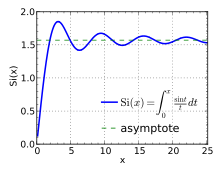Integralsinus

Verlauf
des Integralsinus im Bereich 0 ≤ x ≤ 8π
Der Integralsinus ist ein Begriff aus der Mathematik und bezeichnet eine durch ein Integral gegebene Funktion. Joseph Liouville (1809–1882) bewies, dass der Kardinalsinus nicht elementar integrierbar ist.
Der Integralsinus ist definiert als das Integral der Sinc-Funktion:
.
Eigenschaften
- Im Grenzübergang
kann das Integral ausgewertet werden. Es gilt:
- Dies wird im Folgenden bewiesen:
- Sinus:
- gilt mit der Integralexponentialfunktion
- Die Entwicklung in eine Taylorreihe an der Stelle 0 liefert die kompakt konvergente Reihe:
Eng verwandt ist der Integralcosinus Ci(x), der zusammen mit dem Integralsinus Si(x) in parametrischer Darstellung eine Klothoide bildet.
Spezielle Werte
Verwandte Grenzwerte
Siehe auch
Literatur
- Horst Nasert: Über den allgemeinen Integralsinus und Integralkosinus.


© biancahoegel.de
Datum der letzten Änderung: Jena, den: 01.05. 2021